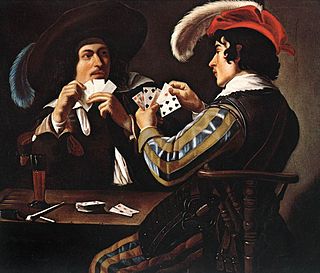
A card game is any game that uses playing cards as the primary device with which the game is played, whether the cards are of a traditional design or specifically created for the game (proprietary). Countless card games exist, including families of related games. A small number of card games played with traditional decks have formally standardized rules with international tournaments being held, but most are folk games whose rules may vary by region, culture, location or from circle to circle.

Pinochle, also called pinocle or penuchle, is a trick-taking ace–ten card game, typically for two to four players and played with a 48-card deck. It is derived from the card game bezique; players score points by trick-taking and also by forming combinations of characters into melds. It is thus considered part of a "trick-and-meld" category which also includes the game belote. Each hand is played in three phases: bidding, melds, and tricks. The standard game today is called "partnership auction pinochle".

A trick-taking game is a card or tile-based game in which play of a hand centers on a series of finite rounds or units of play, called tricks, which are each evaluated to determine a winner or taker of that trick. The object of such games then may be closely tied to the number of tricks taken, as in plain-trick games such as contract bridge, whist, and spades, or to the value of the cards contained in taken tricks, as in point-trick games such as pinochle, the tarot family, briscola, and most evasion games like hearts. Trick-and-draw games are trick-taking games in which the players can fill up their hands after each trick. In most variants, players are free to play any card into a trick in the first phase of the game, but must follow suit as soon as the stock is depleted. Trick-avoidance games like reversis or polignac are those in which the aim is to avoid taking some or all tricks.
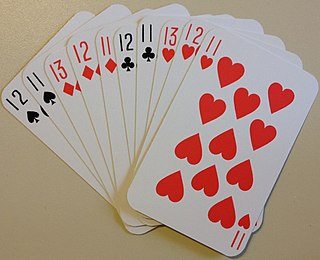
500 or Five Hundred is a trick-taking game developed in the United States from Euchre. Euchre was extended to a 10 card game with bidding and a Misère contract similar to Russian Preference, producing a cutthroat three-player game like Preference and a four-player game played in partnerships like Whist which is the most popular modern form, although with special packs it can be played by up to six players.

Tarocchini are point trick-taking tarot card games popular in Bologna, capital city of the Emilia-Romagna region of Italy and has been confined mostly to this area. They are the diminutive form of tarocchi, referring to the reduction of the Bolognese pack from 78 to 62 cards, which probably occurred in the early 16th century.
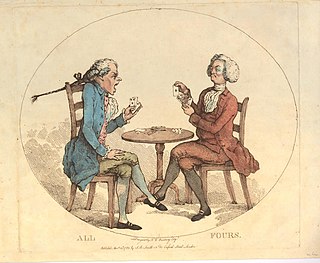
All fours is a traditional English card game, once popular in pubs and taverns as well as among the gentry, that flourished as a gambling game until the end of the 19th century. It is a trick-taking card game that was originally designed for two players, but developed variants for more players. According to Charles Cotton, the game originated in Kent, but spread to the whole of England and eventually abroad. It is the eponymous and earliest recorded game of a family that flourished most in 19th century North America and whose progeny include pitch, pedro and cinch, games that even competed with poker and euchre. Nowadays the original game is especially popular in Trinidad and Tobago, but regional variants have also survived in England. The game's "great mark of distinction" is that it gave the name 'jack' to the card previously known as the knave.

Euchre or eucre is a trick-taking card game commonly played in Australia, Canada, Great Britain, New Zealand, and the Midwestern United States. It is played with a deck of 24, 28, or 32 standard playing cards. There are normally four players, two on each team, although there are variations for two to nine players.
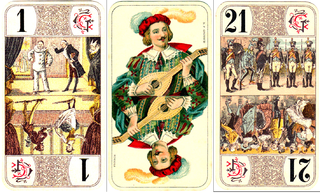
The game of French Tarot is a trick-taking strategy tarot card game played by three to five players using a traditional 78-card tarot deck. The game is the second most popular card game in France and is also played in French-speaking Canada. It should not be confused with French tarot, which refers to all aspects of cartomancy and games using tarot cards in France.
Pitch is the American name of the English trick-taking game of Blind All Fours which, in turn, is derived from classic All Fours. Historically, Pitch started as "Blind All Fours", a very simple All Fours variant that is still played in England as a pub game. The modern game involving a bidding phase and setting back a party's score if the bid is not reached came up in the middle of the 19th century and is more precisely known as Auction Pitch or Setback.
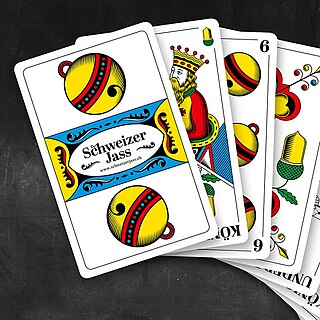
Jass is a family of trick taking, ace–ten card games and, in its key forms, a distinctive branch of the marriage family. It is popular in its native Switzerland as well as the rest of the Alemannic German-speaking area of Europe, Italian South Tyrol and in a few places in Wisconsin, Ohio, California, Oregon and Washington USA.

Cego is a Tarot card game for three or four players played mainly in and around the Black Forest region of Germany. It was probably derived from the three-player Badenese game of Dreierles when soldiers deployed from the Iberian Peninsula during the Napoleonic Wars and, based on a Spanish game they had encountered, introduced Cego's distinctive feature: a concealed hand, or blind. Cego has experienced a revival in recent years, being seen as part of the culture of the Black Forest and surrounding region. It has been called the national game of Baden and described as a "family classic".

Troggu is a member of the tarot family of card games. Synonyms for the game's name are: Trogga, Tappu and Tappä. It is played in the area of Visp, Switzerland, in Upper Wallis, especially in St. Niklaus and Grächen. After Troccas, it is the second most played tarot card game in Switzerland.
Smear is a North-American trick-taking card game of the All Fours group, and a variant of Pitch (Setback). Several slightly different versions are played in Michigan, Minnesota, Northern and Central Iowa, Wisconsin and also in Ontario, Canada.

Tarot games are card games played with tarot packs designed for card play and which have a permanent trump suit alongside the usual four card suits. The games and packs which English-speakers call by the French name Tarot are called Tarocchi in the original Italian, Tarock in German and similar words in other languages.
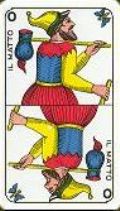
Scarto is a three player trick-taking tarot card game from Piedmont, Italy. It is a simple tarot game which can serve as an introduction to more complex tarot games. The name comes from the discarded cards that were exchanged with the stock, which is also the origin of the name for the Skat card game.
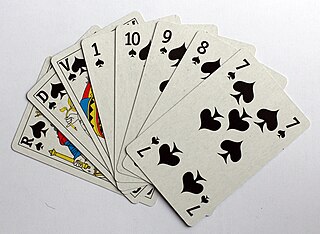
Triomphe, once known as French ruff, is a card game dating from the late 15th century. It most likely originated in France or Spain and later spread to the rest of Europe. When the game arrived in Italy, it shared a similar name with the pre-existing game and deck known as trionfi; probably resulting in the latter becoming renamed as Tarocchi (tarot). While trionfi has a fifth suit that acts as permanent trumps, triomphe randomly selects one of the existing four suits as trumps. Another common feature of this game is the robbing of the stock. Triomphe became so popular that during the 16th century the earlier game of trionfi was gradually renamed tarocchi, tarot, or tarock. This game is the origin of the English word "trump" and is the ancestor of many trick-taking games like Euchre and Whist. The earliest known description of Triomphe was of a point-trick game, perhaps one of the earliest of its type; later, the name was applied to a plain-trick game.

Dobbm or Tappen is a card game played in the Stubai valley in Austria and is one of a family of games derived from the Tarot game of Grosstarock by adapting its rules to a regular, shortened pack of 36 cards. The ranking and point value of the cards in Dobbm is typical of the family and, like its other members, one player always plays as a soloist against all the others. It is highly popular in the Stubai valley among card players of all generations, but is unknown in the surrounding regions.

Droggn, sometimes called French Tarock is an extinct card game of the Tarock family for three players that was played in the Stubai valley in Tyrol, Austria until the 1980s. Droggn is originally local dialect for "to play Tarock", but it has become the proper name of this specific Tarock variant. An unusual feature of the game compared with other Tarock games is the use of a 66-card deck and that, until recently, there was no record in the literature of a 66-card game and no current manufacturers of such a deck. The structure of the game strongly indicates that it is descended from the later version of Tarok l'Hombre, a 78-card Tarock game popular in 19th-century Austria and Germany, but with the subsequent addition of two higher bids.

Blattla is a Bavarian card game for four players, who usually form two teams of two for each deal. It is a simplified version of Schafkopf and Bierkopf and is thus a point-trick game. Unlike those two games, in Blattla the Obers and Unters are not permanent trumps. In order to learn the rules of Schafkopf, it can be an advantage to first become familiar with Blattla. The game is traditionally played with Bavarian pattern cards.
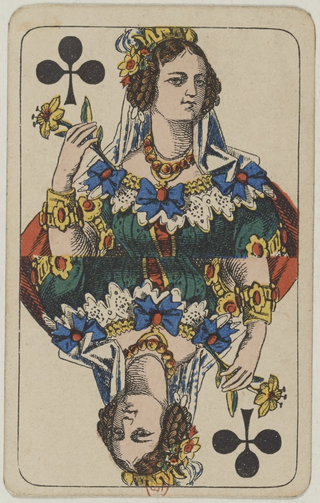
Sjavs is a Danish card game of the Schafkopf family that is played in two main variants. In Denmark, it is a 3-player game, played with a shortened pack of 20 cards; in the Faroe Islands, where it is very popular, it is a four-hand, partnership game using a standard piquet pack of 32 cards.



















